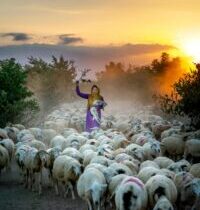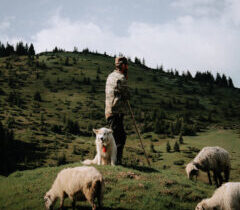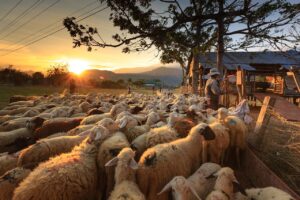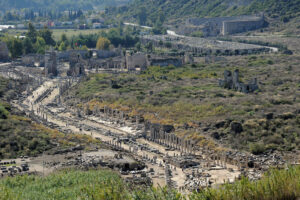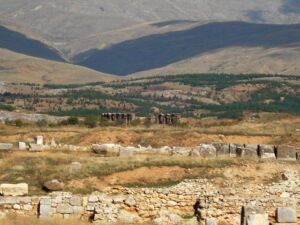Help in Time of Need – The Shepherd
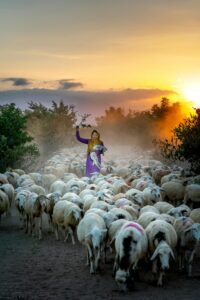 The afternoon was bright and sunny. The ocean was quiet. The breeze was gentle. All was peaceful and calm.
The afternoon was bright and sunny. The ocean was quiet. The breeze was gentle. All was peaceful and calm.
Suddenly, the chickens next door began to squawk and race around their yard. The roosters began to crow at the top of their lungs. The dogs barked up a racket. Something drastic was happening and they were telling the world.
Neighbors wondered if someone had fallen or if there had been some sort of accident to provoke such an uproar. But when they checked, all seemed fine and the animals had quieted again.
Later, the owner of the chickens and dogs explained that he had seen what looked like a badger approaching the house. The animals had responded according to their nature. The chickens were panicked, not having a great number of self-defense options! The dogs had shouted a warning to their owner that a serious problem was needing attention. And with all the uproar, the threatening animal changed plans and went back to the field.
St. John tells us that Jesus spoke of himself as the Good Shepherd. In biblical times, prophets often spoke of the leaders of the people as being their shepherds. This made sense with an historically pastoralist people, who raised sheep and goats and traveled with their animals. Jesus took the idea of shepherd farther than the traditional one of God as the Shepherd of Israel and leaders who failed to obey the Law as bad shepherds. Jesus declared, “I am the Good Shepherd.” In saying this, he was using the same terminology and usage as God had used when he spoke from the burning bush to Moses, “I Am.” This was one of seven times in John’s Gospel that Jesus speaks of himself in divine terms.
Jesus speaks of the role of the Good Shepherd as watching over the sheep and protecting them. Remembering my niece’s comment about sheep being dumb as compared with goats, I find Jesus’ statement even more striking. The Good Shepherd cares about the sheep, even if, and maybe because, they are not the most intelligent animals. The Good Shepherd will protect the sheep even at risk of his own life. Jesus will give his own life for his sheep. Those who do not own the sheep will not do this. When the wolf (or badger or hawk in the case of the chickens) comes creeping up on the sheep, the hired shepherd might well run away. Wolves are not animals that are easily defeated. They work together in packs and don’t hesitate to go after humans too, if necessary to get the sheep.
When Jesus spoke about being the Good Shepherd, it was expected that only the Hebrew people were of interest to God. God was still a deity of only one relatively small group of people. Outsiders had no place among those to be protected by the shepherd. Jesus, however, did not consider only the Jews to be the sheep loved and protected. “I have other sheep that do not belong to this fold.” His mission is big enough to include all peoples. All are to be members of one flock. And all will be included in the salvation gained for them by the good shepherd who dies rather than allowing them to be lost. (Jn 10:11-18)
This was a huge expansion of understanding of the relationship between God and humanity. Through Jesus, God’s love and call extended formally to all. Those who believe and follow him become children of God. (1 Jn 3:1-2)
Because of the close relationship between the shepherd and the sheep, miraculous healings continued after the Resurrection through the actions of the apostles, as signs of Jesus’ power and relationship with the Father in the Trinity. Humans don’t typically have the power to heal with a word or a touch. But Jesus does. (Acts 4:8-12)
Like the owner of the chickens and dogs who faced the badger this past week, Jesus and his followers step up to help those who need extra help. This includes those with little money, those who have health issues, those whose physical safety is threatened, those who must leave their homes to protect themselves and their children, those who learn new skills or do jobs that don’t take advantage of their existing education but allow them to send funds to help their families far away. Thus, many, many people follow the Good Shepherd and do what they can to help and protect the sheep. And the Good Shepherd is there among all of us, his sheep, with all the messiness of our lives, walking with us and helping us along the way.
In this next week, let’s reflect on the ways we experience the protection and love of our Shepherd. Let’s also reflect on how we can share in his mission and help protect others whom we meet in our daily lives.
Readings for the Fourth Sunday of Easter – Cycle B
Read More



